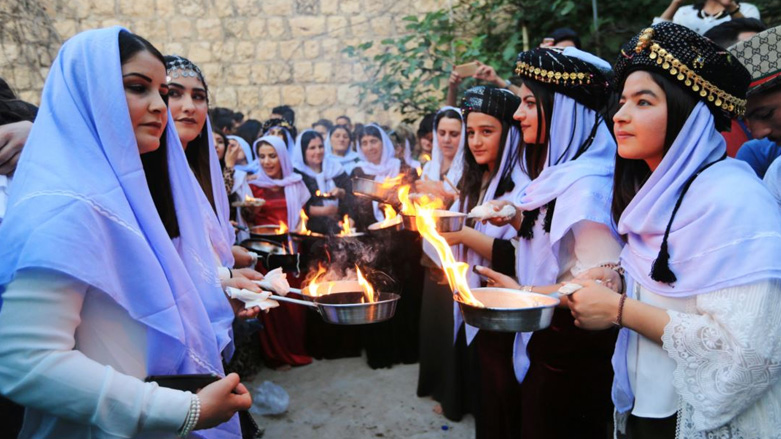Barzani on Red Wednesday: Parties must help Ezidis decide their future

ERBIL (Kurdistan 24) – Masoud Barzani on Tuesday congratulated the Yezidis (Ezidis) on the occasion of Charshamba Sor(Red Wednesday), calling on parties to help the religious minority end its adversities and determine its destiny.
In an address on the eve of the Ezidi New Year, Barzani, the president of the leading Kurdistan Democratic Party (KDP) and the former president of the autonomous Kurdistan Region, extended his warm congratulations to all those who celebrate the occasion in the Kurdistan Region and abroad.
A statement Barzani’s office issued highlighted the “injustice and terrorist crimes…the Ezidi brothers and sisters” have experienced, “tragedies that are unparalleled in history.”
“We strongly support all the aspirations of our Ezidi brothers and sisters and call on all parties to cooperate with them so that they can determine their future, their destiny, heal their wounds, and end their suffering and displacement,” the statement continued.
Barzani currently holds no official governmental post but continues to remain an important Kurdish political figure in the Kurdistan Region and Iraq.
“On this occasion, we assure the Ezidi brothers and sisters and the sons of all other components that Kurdistan is a land of coexistence,” he added. “This culture will be enriched, and brotherhood and harmony will be expanded.”
On Tuesday, dozens of hundreds of Ezidis from the Kurdistan Region and other parts of Iraq gathered in Lalish, in Duhok province, to prepare for the New Year.
Red Wednesday takes place every year in April, usually after the 14th of the month and on a Wednesday.
Ezidis claim to have one of the oldest religions in the world, and their evidence for this is their calendar. According to the Ezidi Calendar, they are now in the year 6769. The Ezidi calendar is older than any other religious calendar such as the Gregorian, Jewish, and Islamic ones.
Before the so-called Islamic State took control of their cities and towns southwest of the Kurdistan Region, Ezidis used to celebrate Red Wednesday at their holy sites in Sinjar (Shingal).
However, in the past few years, they have mainly celebrated the New Year at the Lalish Temple in Duhok.
As part of their tradition, Ezidi women paint eggs on Tuesday and hang flowers at their doorsteps to welcome the New Year.
There are about one million Ezidis worldwide, with almost half of them living in Iraq and the autonomous Kurdistan Region.
The emergence of the Islamic State and its violent assault on Shingal in 2014 led to the displacement of hundreds of thousands of Ezidis. Most of them fled to the Kurdistan Region, while others resettled in neighboring countries in the region or Western states.
Others were not as lucky and remained stranded in the war zone, where they experienced atrocities and mass executions at the hands of the extremist group for years. Militants subjected women and girls to sexual slavery, kidnapped children, forced religious conversions, executed scores of men, and abused, sold, and trafficked females across areas they controlled in Iraq and Syria.
Before the 2014 attack, there were roughly 550,000 Ezidis in the Kurdistan Region and Iraq. As the militants took over large swaths of territory in Nineveh province, 360,000 Ezidis escaped and found refuge elsewhere, according to the Kurdistan Regional Government’s (KRG) Ezidi Rescue Office.
So far, over 69 mass graves which contain the remains of Ezidis have been excavated along with untold numbers of individual graves.
Kurdish and Ezidi Peshmerga forces, with the support of the US-led coalition, liberated Shingal from the Islamic State in November 2015. However, the town remains virtually vacant with little to no basic services available.
Shingal, an area disputed between Erbil and Baghdad, is currently under the control of Iraqi forces and Shia-dominated militias. These forces, plus a limited number of Peshmerga and other Kurdish fighters, are present in Shingal and its outskirts with reports of tensions between them over who will control the strategic town that lies near the Syrian border.
Although their areas were fully liberated from the Islamic State by late 2017, hundreds of thousands of Ezidis remain displaced in the Kurdistan Region due to insecurity and a lack of basic services in their largely-destroyed hometown.
Editing by Karzan Sulaivany
